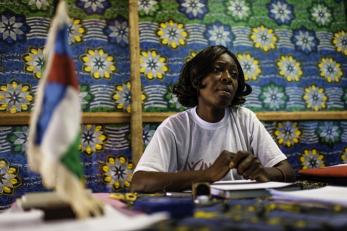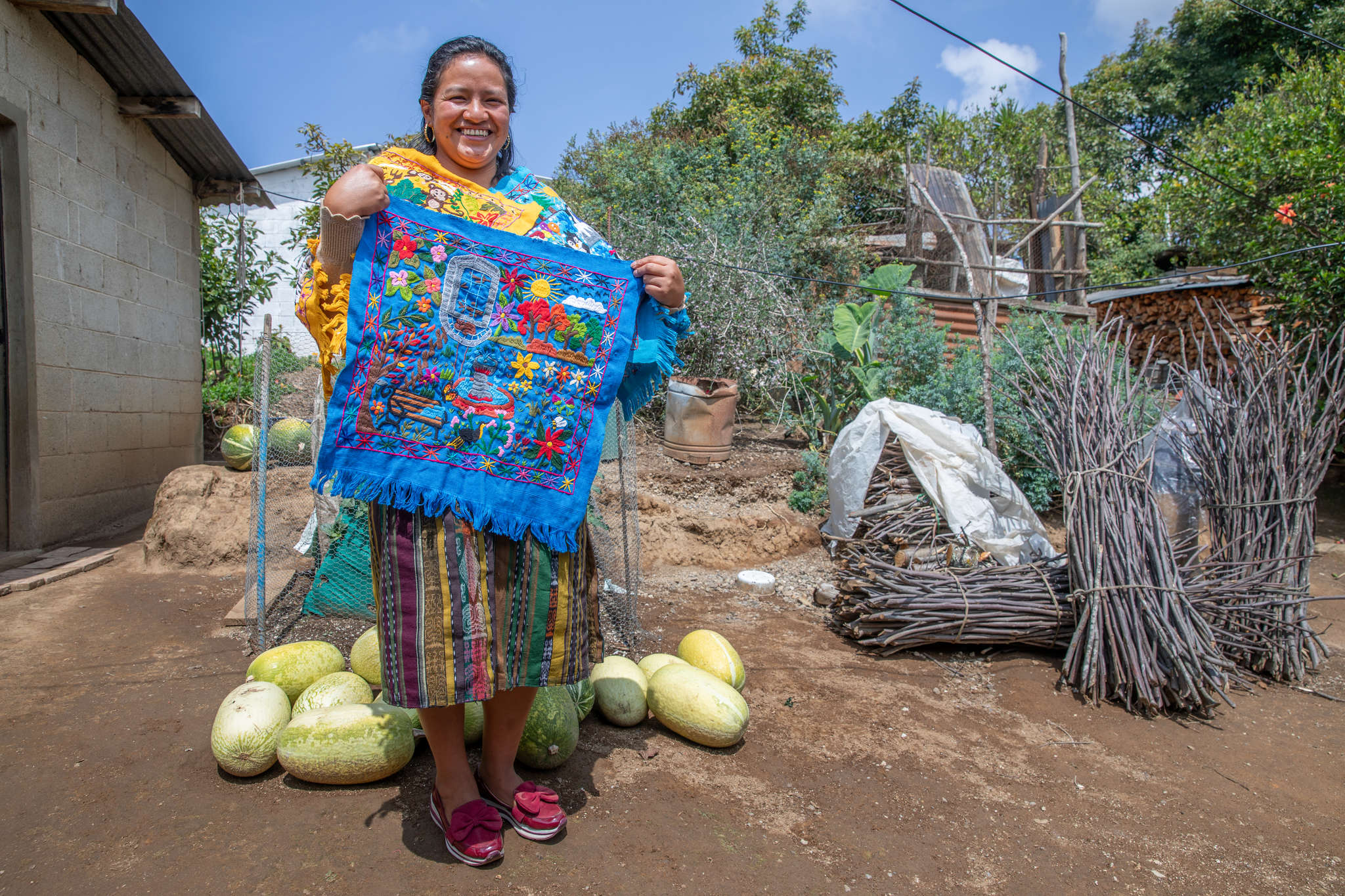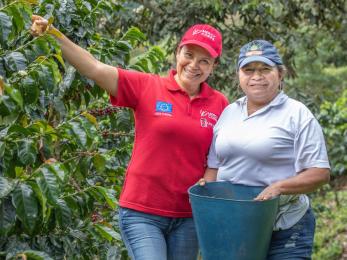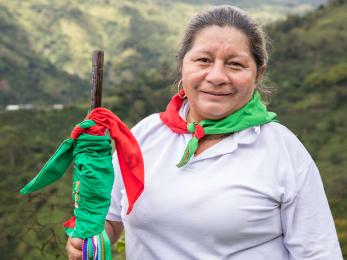Q&A: Working with communities to stop gender-based violence

In developing countries all over the world, women and girls are often seen as less valuable than their male counterparts. This inequality, which remains in many traditional cultures, makes it more difficult for women and girls to get an education, marry when they choose to, earn an income and have a voice in their own life and their communities.
Beyond those obstacles and challenges, the marginalisation of women and girls also makes them more susceptible to gender-based violence (GBV). When they are not seen as equals, women and girls are more likely to be subjected to abuse, assault and rape.
In countries embroiled in conflict, like the Central African Republic (CAR) — where Mercy Corps has worked since 2007 — the risks for this kind of violence are even greater.
“We don’t need numbers to prove that there is a problem with GBV here,” said Kate Rougvie, Mercy Corps’ Gender-based violence and protection Sector Advisor in CAR. “We know from experience that with conflict, the risk of sexual violence skyrockets.”
Here, she explains what survivors of GBV face in CAR and how our long-term work there helps women and girls recover — and communities prevent the problem in the first place.
Q: Can you explain what gender-based violence is and who it affects?
Kate Rougvie: Gender-based violence (GBV) happens all over the world — it means harmful acts carried out against a person’s will. It mostly affects women and girls, because in many cultures they are marginalised and have little or no power to make important decisions about their lives. This makes them particularly vulnerable to violence.
The violence is based on the roles that are given to women by their society. In order to change the balance of power between men and women, we have to target those deep-rooted social, cultural, religious and historical roles.
GBV can also affect men and boys. It’s important that we recognise that and address it appropriately in different contexts.
Q: Why is it important that Mercy Corps work with GBV issues?
Mercy Corps works to promote the full spectrum of human rights for all people, especially through our protection work — addressing GBV is a crucial part of that.
It’s really important that we ensure that women and girls are empowered to access their rights and fulfill their potential. We want them to be protected and to be included as active decision-makers within their societies.
In order to overcome the issue, we need to talk about it. Mercy Corps works to break the silence and stigma around GBV, with the goal of creating strong, sustainable, cohesive and protective societies in which women and girls can flourish.
Q: What are the challenges that women face in countries like CAR?
In countries like CAR, where poverty levels are extremely high and decades of conflict have stalled development, women are particularly vulnerable. Early or forced marriage is common within some communities, as are practices like female genital mutilation.
Because of traditional roles and practices, women typically have little decision-making power over their lives and their households, and very little access to legal protection. It’s not easy for women to access economic opportunities and even when they do, they often don’t have control over how their income is used.
Q: How are the risks they face worsened by conflict?
In times of conflict, the support networks that exist for women and girls are torn apart. In CAR, there used to be women’s groups and associations that offered a crucial level of peer support, but displacement as a result of conflict has divided these groups.
The justice system came to a standstill during the recent conflict, which left nowhere for women and girls to seek security or protection. This can increase harmful behaviour because perpetrators know that nothing bad will happen to them if they hurt someone.
In some contexts, rape and sexual violence are used as a weapon of war. The systematic use of rape to spread terror amongst communities or to perpetuate ethnic cleansing is a tactic that armed groups use to tear apart a community and gain power. Learn more about the current crisis in CAR ▸
Q: Who is most vulnerable to GBV and why?
Women and girls, and in some contexts, boys and men, who live in cultures where they are viewed as not worthy or deserving of their rights are most vulnerable.
When these individuals don’t have access to support from family, their community, or legal protection, they are the most at-risk. This means that people who are displaced, like hundreds of thousands in CAR right now, are constantly targeted.
Q: What usually happens to a woman or girl who has experienced GBV?
Survivors will face different levels of trauma depending on the kind of incident they experienced, and there’s no formula for how a person will react and be affected. In cases of sexual violence, there may be long-term health problems, including the possible transmission of HIV and other STIs.
Survivors of GBV can also suffer a number of psychological consequences including a sense of self-blame, a loss of trust, a loss of self-esteem, anxiety and in some cases, suicidal thoughts and behaviours.
There can also be serious social consequences for survivors. They may be rejected by their partners, families and communities — or face accusations of adultery and severe traditional punishments.
All of these factors impact a survivor’s ability to earn an income, and can lead to poverty and destitution. This increases their vulnerability to further violence, and threatens their ability to participate in their society and live dignified lives.
Sadly, all of these effects also mean that most people do not report cases of GBV. The fear of rejection, retaliation and stigma is so great that most survivors don’t come forward.
Q: How can experiencing GBV negatively affect the future of a young woman's life in CAR?
On a psychological level, GBV is deeply disempowering — it takes control away from a person, it can destroy self-esteem and cause trauma. Without support, a young woman who has experienced GBV may never be allowed to reach her potential, to go to school, to socialise, to work, to fulfill her right to be an active community member, and to be happy.
Socially, she may be rejected by her family, and her community, and may never have a husband or partner - being able to marry is an important cultural rite of passage and part of social status in many cultures. Her economic opportunities may be limited; she may not be able to gain an income.
On a physical level, sexual violence can cause life-long complications, without support these complications may lead to serious illness, to further rejection by the community, or even death. Read one young survivor's story ▸
Q: For women who have experienced GBV, what do they need most?
There’s no set formula for what they may need to overcome their experience. What they need depends a lot on their level of resilience and support systems.
For many survivors it’s important to feel heard, to feel listened to and to not feel blame. Making sure survivors have access to support that can help them heal is a key part of our work. For survivors of rape, it’s important that they have access to potentially life-saving post-rape medical care, which can prevent the transmission of HIV.
Being able to map out a plan for the future can also help survivors heal. Having a secure place to live so they are less at-risk for violence, or having economic and educational opportunities can help them feel like a valued part of their community and restore dignity.
Q: How does Mercy Corps help survivors of GBV?
Mercy Corps in CAR helps survivors through two approaches. The first is prevention work, which aims to change harmful behaviours within communities and put an end to GBV at its root causes. The second approach is response work — we provide access to quality psychosocial support, legal services for GBV survivors, and life-saving medical care.
We work through large networks of community volunteers who have been trained by Mercy Corps on GBV, women and children’s rights and how to support survivors in their community.
These volunteers often accompany survivors from their community to our listening centres and organise awareness-raising activities that aim to reduce stigma, empower survivors to come forward and create protective, cohesive communities.
We feel that working through local communities is the best way to make long-lasting change and to reduce negative attitudes and behaviors around GBV and women’s rights.
Q: What do our listening centres in CAR offer survivors of GBV?
In CAR we work in five different locations across the country — in each location we have a listening centre where survivors can come for counseling and legal support from our trained staff. Here, survivors can meet one of our psychosocial agents in a safe and confidential space.
They can tell us as much or as little about the incident as they want – everybody is different. Our staff is able to offer a basic psychological assessment and counselling — listening to the survivor, allowing them to feel comfortable and safe, and helping them start a healing process.
They can tell survivors about the choices they have for different services — like visiting the hospital, going to the police, or joining vocational training, and they will accompany the survivor every step of the way if that’s what the survivor wants.
Mercy Corps makes sure that survivors are in the driving seat during this process, and this is already an important step towards empowerment and rebuilding self-esteem and a sense of control.
Q: How do those services help survivors recover?
Counselling can help a survivor to feel safe, to feel in control, to reduce anxiety, and to help the healing process begin. It also helps a survivor to know more about the options that are available to them, and how they can move forward. Counselling can happen over a long period of time, until a survivor feels that their needs have been met, and that they are ready to integrate back into their society.
Legal advice can also help survivors to feel empowered, as they are given the information they need to make an informed decision about their next steps.
Mercy Corps, along with our partner, can accompany survivors through a legal process. The justice system in CAR is not fully functional at this point, but as the situation improves, Mercy Corps will continue to advocate for justice and the rights of survivors.
Q: How can we help prevent GBV?
Changing harmful beliefs, attitudes, practices and behaviors is a process that takes place over a long period of time. Working through the community, we’re able to organise outreach activities that give communities new information.
Our local volunteers, with support from Mercy Corps, carry out debates, sketches, and campaigns that educate people about the roots of GBV, its harmful consequences and about women and children’s rights.
Mercy Corps also recognises the crucial role that men play in preventing GBV. We work with a number of traditional male community leaders to help establish positive role models for men and boys within the community.
Q: How can we teach communities to prevent and deal with GBV on their own?
By carrying out trainings with women’s groups and male leaders on basic psychosocial support, women’s rights, and the importance of reducing stigma, social support mechanisms will grow stronger and more effective, especially in the face of the ongoing conflict.
We believe in the power of transferring key skills to the community, so we work with local women’s groups, youth associations, and groups of traditional male leaders to make sure that the work we do is sustainable, and is passed on throughout the community.


